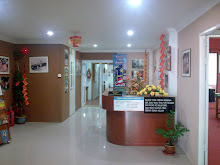Tasik Ken-yir, the largest man-made lake in South-East Asia, has been officially declared a Duty Free Zone (DFZ).
Terengganu Mentri Besar Datuk Seri Ahmad Said said this was confirmed through an official letter dated Sept 21 from the Finance Ministry.
“The state government will inject an initial fund of RM100mil for the makeover of Kenyir.
“We will ensure that the DFZ is a catalyst for the development of Kenyir which has been neglected for the past 30 years,” he told reporters after chairing the weekly state exco meeting here yesterday.
Ahmad said Kenyir would be turned into a top holiday destination over the next two years and the state government would woo local and foreign investors, especially manufacturers of branded attire, watches, shoes and other consumer products to set up outlets.
“We will also host a myriad of international events in Kenyir from now on,” he added.
Kenyir, Ahmad noted, was blessed with 340 islands while being rich in flora and fauna, but there had been no aggressive promotions to turn the area into a popular tourist destination.
“The Terengganu government hopes the DFZ will act as an impetus for the growth of eco-tourism in the area,” he said.
Proposed developments include the construction of hotels and chalets, a theme park, orchid garden, fruit orchard as well as bird and butterfly parks.
Kenyir will also be turned into a shopping paradise, catering to both high-end holidaymakers and shoe-string travellers.
Ahmad said a duty-free complex, shophouses, condominiums and Customs Department complex would also be constructed in the next two years.
He said the state government would call for a tender today for the laying of RM33mil electrical cables to Pulau Bayas in Kenyir so that the island could be developed for tourism.
A Setiu-based environmentalist, Dr Azman Ibrahim, meanwhile, urged the state government to carry out an environmental impact assessment before going ahead with the plan.
The rich eco-system in the Kenyir area should not be compromised, although the plan could turn it into a revenue spinner for the state and the local community, he said.
Dr Azman said the state government should not ignore that the man-made lake was home to more than 8,000 species of flowers, 2,500 species of plants and trees as well as more than 300 species of freshwater fish.
Any physical developments in areas edging the lake could contaminate the water, he said.
The Star 29/09/2010
Thursday, September 30, 2010
Subscribe to:
Post Comments (Atom)



.jpg)

No comments:
Post a Comment